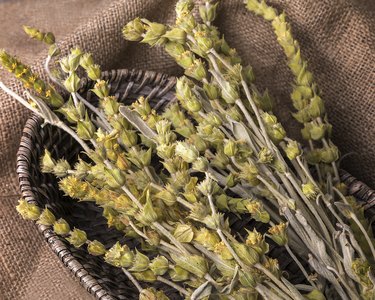
Greek mountain tea, also known as ironwart or shepherd's tea, is made from the leaves of plants from the Sideritis genus. It is also referred to as Sideritis syriaca, and its health benefits are plentiful.
Greek mountain tea is made from freshly harvested herbs in the Mediterranean. It is available as dried loose tea or in tea bags in health food stores and some grocery stores. It may help with digestive health and contains natural antioxidants.
Video of the Day
Video of the Day
Greek Mountain Tea Benefits
There are more than 150 species of plants in the Sideritis genus. These plants have anti-microbial, anti-inflammatory, antioxidant and anti-spasmodic properties. They are rich in a number of natural antioxidants, including flavonoids, and contain essential oils.
According to a May 2018 article published by Pain Research and Management, plants in the Lamiaceae family (which includes the Sideritis genus) are widely used for medicinal purposes in areas of the world — more commonly outside the United States. Sideritis scardica, also known as Greek mountain tea, is one of them.
According to the authors, Greek mountain tea herb benefits are numerous. This substance can help prevent anemia and is beneficial in treatment of lung conditions, ADHD, anxiety and depression, gastric ulcers and neurological conditions. It can also be helpful for pain management.
Lower Blood Pressure
A study featured in the October 2012 issue of the Journal of Physiology and Pharmacology found that extracts made from Sideritis helped lower blood pressure levels while helping blood vessels to relax.
The animal study measured arterial blood pressure and found that a dose of Sideritis extract led to blood vessel dilation, which helped lower blood pressure levels and reduced stress on the heart muscle.
While the studies helped support the use of Sideritis for its heart health benefits, further research is needed before Greek mountain tea can be considered a treatment for cardiovascular conditions.
Protect Your Digestive System
In March 2012, Planta Medica published an animal study on the effects of Greek mountain tea on gastrointestinal health and disorders. Researchers found that taking an oral dose of Greek mountain tea led to less inflammation in the gastrointestinal tract, likely due to the presence of phenols and antioxidants found naturally in the plant.
Researchers also found that taking the supplement led to reduced inflammation and toxicity in the long term, demonstrating Greek mountain tea's protective abilities. While the results were promising, further study is needed on Greek mountain tea as an herbal treatment for gastrointestinal complications.
Read more: 10 Everyday Ailments Soothed by Tea
Brewing Greek Mountain Tea
When brewing Greek mountain tea from fresh plants, you can use the flowers, stem and leaves of the plant. Place around six to eight 2-inch pieces of the plant into boiling water and lower the heat, allowing it to simmer for five to 10 minutes depending on how strong you like the tea.
Greek mountain tea has an earthy taste and, if you use the flowers, a slight floral scent. For dried tea leaves or tea bags, add about 2 tablespoons, or a third of a tea bag, into a teapot and fill with boiling water, letting it steep for five to 10 minutes. You can add honey as well as milk or lemon to flavor the tea.
- Planta Medica: "Anti-inflammatory, Gastroprotective, and Cytotoxic Effects of Sideritis Scardica Extracts"
- Journal of Physiology and Pharmacology: "Hypotensive, Vasorelaxant and Cardiodepressant Activities of the Ethanol Extract of Sideritis"
- Pain Research and Management: "Medicinal Plants of the Family Lamiaceae in Pain Therapy: A Review"
Was this article helpful?
150 Characters Max
0/150
Thank you for sharing!
Thank you for your feedback!